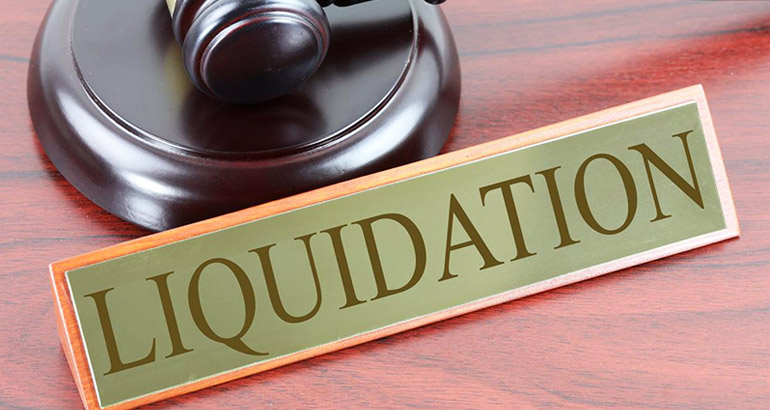Company Liquidation for Beginners
Company Liquidation for Beginners
Blog Article
Unknown Facts About Company Liquidation
Table of ContentsWhat Does Company Liquidation Do?Not known Incorrect Statements About Company Liquidation The smart Trick of Company Liquidation That Nobody is Talking About3 Simple Techniques For Company LiquidationWhat Does Company Liquidation Do?
A liquidator is especially designated to manage the winding up of a firm's events in order for it to be folded typically when the firm is declaring bankruptcy. The liquidator is a neutral 3rd celebration who supervises the sale of company assets in order to pay off any kind of arrearages.Their duty includes, but is not limited to: Neutral Movie director: A liquidator is tasked with serving as an unbiased third event to manage the entire firm liquidation procedure. Produce Statement of Matters: Liquidators need to create a comprehensive declaration of events document. This record is distributed to creditors, describing the present financial standing of business at the time of its liquidation.
After the liquidation of a business, its presence is eliminated from Companies Home and it stops to be a lawful entity. If directors navigated the process without issue, there would be no penalties or individual liability for strong debts anticipated. Now, with a clean slate, directors can check out new service opportunities, though professional consultation is suggested.
The 8-Minute Rule for Company Liquidation
For example, if even more than 90% of all firm investors agree, liquidation can happen on brief notification within 7 days, the minimum statutory notice for lenders. Generally, the larger the liquidation and the more assets and capital the company has, the longer the process will take. 'Do I have to pay to liquidate my firm?', the answer will depend on whether or not your business has any properties remaining when selling off.

We comprehend that no 2 business coincide, which is why we will take the time to obtain to recognize your organization so we can suggest the most effective program of action for you. We just operate in your finest interests, so you can be totally certain in the solution we supply.
Company Liquidation - Truths
In the UK, there is an established process to shutting down or restructuring a minimal business, whether it is solvent or bankrupt. This procedure is understood as liquidation and can only be managed by a certified bankruptcy specialist (IP) according to the Insolvency Act imp source 1986. There are 4 major kinds of business liquidation process: Lenders' Volunteer Liquidation (CVL); Mandatory liquidation; Management; and Members' Voluntary Liquidation (MVL).

In you could try here these scenarios, it is essential that the firm stops trading; if the business continues to trade, the supervisors might be held directly liable and it can result in the bankruptcy practitioner reporting wrongful trading, referred to as misfeasance, which may cause lawsuit. The supervisors designate a bankruptcy practitioner and when this has actually been agreed and verified, there is a conference with the shareholders.
Of training course, if there are no investors, this action of the process is not necessary (Company Liquidation). The IP takes control of the business and starts the business liquidation procedure. The directors are no much longer associated with what takes place, consisting of the sale of the firm's assets. However, if the directors want any of the assets, they can notify the IP.
All About Company Liquidation
The main distinction is that the business's lenders related to the court for an ending up order which requires the insolvent firm right into a liquidation process. In many cases, creditors take this action as a last resort due to the fact that they haven't received settlement with various other types of negotiation. The court appoints a bankruptcy practitioner, additionally called a main receiver, to conduct the required business liquidation procedure.
This type of business liquidation is not voluntary and directors' conduct is reported to the UK's Assistant of State once the liquidation process has actually been completed. Any type of supervisor that fails to comply with the IP or has actually been involved in director transgression, or a fraudulent act, may result in severe effects.
It is used as a method to shield the company from any lawsuit by its financial institutions. The directors of the company agree to make routine settlements to resolve their debts over an amount of time. The appointed administrator manages the volunteer management process, and receives the payments which they then distribute to lenders according to the concurred quantities.
What Does Company Liquidation Do?
This supplies the business with time to develop a strategy going onward to rescue the company and stay clear of liquidation. Nonetheless, at this point, directors hand control of the firm over to the selected administrator. If a company is solvent yet the supervisors and shareholders desire to Resources close the business, a Participants Voluntary Liquidation is the right option.
The firm liquidation process is taken care of by a liquidator selected by the directors and investors of the company and they have to authorize a declaration that there are no financial institutions remaining. The liquidation procedure for an MVL resembles that of a CVL because possessions are realised however the proceeds are distributed to the supervisors and the shareholders of the firm after the liquidator's charges have actually been paid.
Report this page